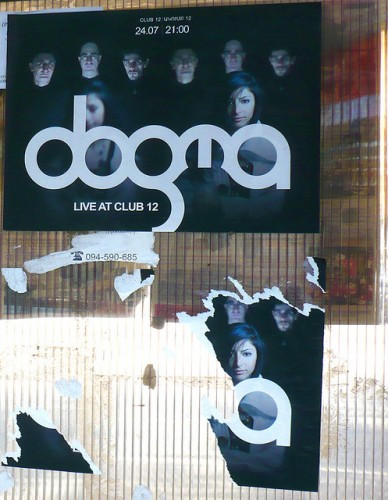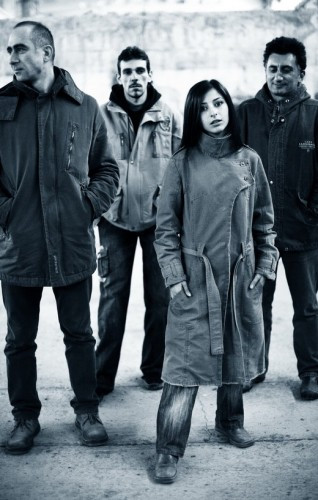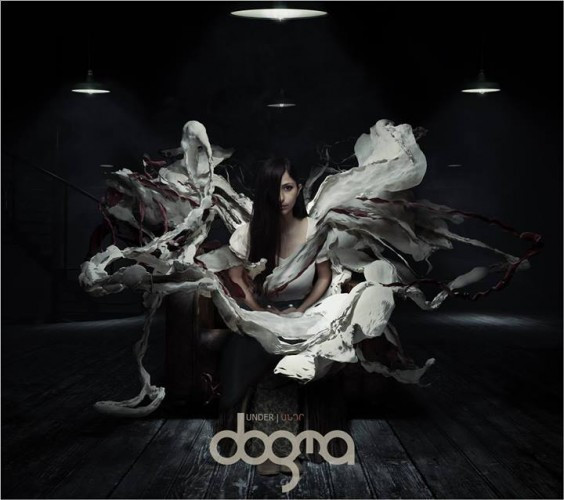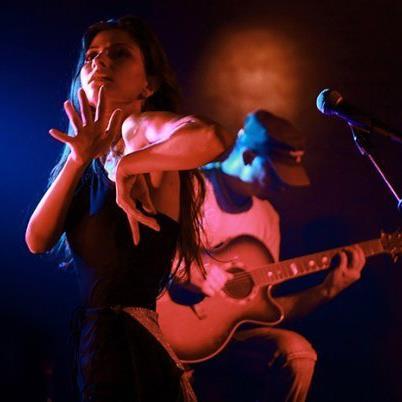(We welcome this guest review by one our Italian readers whose name is Pietro.)
The thing with Folk has been excellently summarized by Jon Voight, in an episode of Ray Donovan when he puts a gun to Rosanna Arquette’s head and screams: “Am I authentic enough for you, fucking tourist?”. Folk today comes too often in super glossy, ultra-cool, mega-polished coffe-table editions. Sometimes that’s a good thing. Most of the time, it’s just too domesticated. Airport souvenirs. We’re all fucking tourists. But sometimes, as is the case with Armenian progressive metal band Dogma, Folk can be just an incredibly pleasant surprise.
In 2008 I was travelling through Armenia, and while strolling along the green parks of Yerevan, the capital city, a gig poster took my attention. I was late for the gig, but the visual style was intriguing, so much so that I took a photo (above) and, once back home, began some investigating.
I found out that the band had come together only months before, and they had a blog. A few weeks later I was the proud owner (probably the only one in Italy) of Dogma’s sophomore release, Ethnic Methnic, a highly accomplished piece of work, cleverly alternating metal stompers and acoustic ballads. Contemporary music infused with traditional melodies, dominated by the incredible vocal talents of Zara Gevorgyan.
Folk is a tricky thing. It is meant to be heard in market squares, in drinking bars, during feasts.
It has to hook you in fast, so the melodies must be simple and easy. Yet it has to progress, to tell a story, because every Folk song is the promise of a journey, so it has nuances, subtle changes, bumps, stops, uphills and downhills, mountains and valleys.
Repetition is paramount, because you can’t expect people to be paying full attention, so you go over the same verses twice or more, in order to make sure everyone is on par with the story. But the best quality of Folk, is that Folk is wise. Its melodies might be simple but are never trite or silly. They never leave you alone in the middle of nowhere. You can carry them with you a long time, and they are never a burden. You never get sick of them.
There’s a double nature, like a two-edged sword, at the heart of Dogma’s music. In the band’s own words: “a compound fusion of Armenian ethnic melody and progressive metal elements, which can transfer the listener from a powerful mountainous landscape to a serene apricot garden in the blazing sun.”
Last December Dogma published their second album, Under Dogma, available on iTunes and Amazon.
The album has 10 songs, 6 sung in Armenian and 4 in English, and has double song titles, in Armenian and English. I’ll stick to the English titles in this review. The album as a whole has great production values; all the sounds are crisp and clean, and all the instruments can be heard clearly.
The journey starts strong with “Sand Leopard”, in which guitarist and songwriter Heno Grigoryan crafts a chiseled ethnic chord and turns it into a metal riff, backed by the full, round sound of bass player (and producer) Vardan Grigoryan and the precise, imaginative drumming of Derek Vardumyan. But as soon as Zara’s vocals enter the scene, you know it’s her show.
This young woman can channel an incredible variety of different emotions, feelings, colours, and textures through her voice alone. Sounding menacing one note, smiling and comforting the next, it’s like meeting a mysterious goddess from the past, speaking an unknown toungue, reeking of ancient heritage.
Second song “Who Has Seen?” is an acoustic ballad, which takes off in the middle section with Zara ad-libbing just like a dancer on a square would, following the music with sounds more than words. The song finale explodes in an eruption of black electricity, with the voice of the goddess spiralling into a cloud of darkness and dust.
“Who Are You For?” holds you in suspended animation, lost in a sleepless night, before revealing herself as a doom crusher, infused with pure Black Sabbath vibe. That is, if Black Sabbath were nomads of the desert.
There is more doom darkness in the following song, “Expectation”, again alternating clear and heavy, acoustic vibrance and electric fury. Heno Grigoryan takes center stage, creating a middle section with an elaborate tapestry of guitars, electric and acoustic, in conflict like ancient gods, none prevailing over the other, backed by the excellent rythmic section.
“Melancholy” is the first song in English. It’s probably not the best idea, since a little struggling can be heard, but still Zara shows her chops with a unique take on syllables and metrics, stretching vowels like she’s knitting wool. It’s a classic rock ballad, which takes flight when Vardumyan’s sensible, melodic drumming kicks in.
NCS readers more on the extreme side might want to start off with track number 6, the aptly titled “Black”, the only tune featuring harsh vocals (in English) courtesy of Vardan Araqelyan. It begins with the perfect Tony Iommi arpeggio, taking you on a nocturnal flight over the desert, with a genie singing softly in your ear, before morphing into a merciless vortex of black smoke and glass sand, in which the wrathful god and the genie fight to tear the listener apart.
“Hori-Loro” is a masterpiece. Imagine you’re a nomad in a caravan, traveling the vast land by horse or camel, trading salt. This is the rhythm that shapes your days: the gentle, caressing ups-and-downs of your mount, while cities, forests, plateaus pass your way.
And at the end of the day, the caravan stops and it’s time for sleep. “Joyspread” is the perfect lullaby, the kind you could only dream of until today, full of love and motherly comfort.
I have mixed feelings about “Argument”. It starts with a great bass line but relies too much on the synth riff, sounding like a lost song from In Through the Out Door. Zara weaves a jazzy, sultry, dark lady tango, a spiralling dance that flares in white electric fire in the finale.
The journey ends with “Falling”, an elegy that turns into a gentle dance, fading away like a fire in the night. Was it all real? Where has this enchanted land gone?
While in Armenia, someone asked: how do you find the sound of our language, hard or sweet?
I answered, sweet. Listening to Zara, I understand that it can be both. Duality is again the core of Dogma: ethnic and modern, acoustic and heavy, light and darkness, ancient and contemporary.
This is certainly not the heaviest record you’ll hear this year, yet it bursts with generosity and creativity. In a metal world where most female singers seem content to stick to their soprano virtuosity (and their boobs), the incredible variety of Zara’s singing proves that there are many more roads to be travelled.
You could do worse than let this little gem pass you by.





not bad, not bad at all.
Hot damn, Zara’s voice is impressive. The band almost remind me of Royal Thunder, in the sense that both have stupendously good singers over awesome, but less arresting instrumental backgrounds.